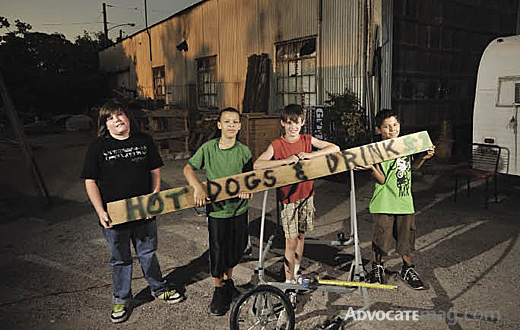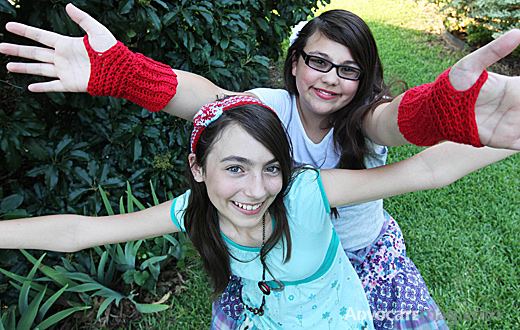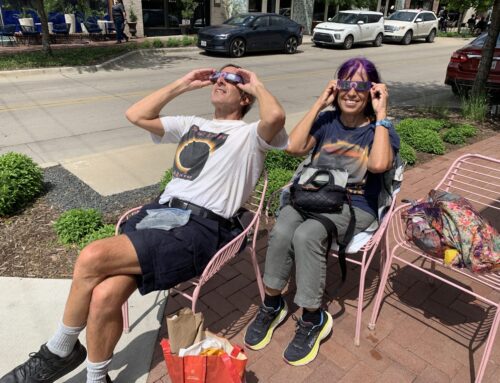It’s never too late to do something big. It’s never too early, either.
Typical kids spend untold summer hours watching television, networking on Facebook, playing video games and hanging at the mall, happily oblivious to the pressures of turning a buck.
But a few young people possess a beyond-their-years business savvy coupled with the rare desire to launch an early career or do their part to better the world.
Meet the neighborhood’s most enterprising youths — trust us, they are people you might want to know in the future.

Asher Roberts and three classmates at Rosemont Elementary School construct their hot dog cart. Photo by Can Türkyilmaz
The hot-doggin’ musketeers
Name: Asher Roberts
Age: 10
Biz: Bicycle hot-dog cart
Asher Roberts thought it would be cool to have a taco stand.
The 10-year-old is the son of seemingly omnipresent Oak Cliff community activist Jason Roberts, who spearheads events such as the Better Block projects.
“My dad always does these events, and there are usually these food carts,” Asher says.
He decided he wanted a food truck of his own. But there’s the small problem of a driver’s license. And in Oak Cliff, tacos are everywhere. So Asher adapted the idea.
He recruited three of his classmates at Rosemont Elementary School to help him start a bicycle hot-dog cart this summer.
“Hot dogs are easier, and there isn’t really a hot dog place in Oak Cliff,” he says.
They’re saving their allowances (Asher says his is $4 a week), and any other money they can come up with. Asher and one of his partners, Pierce Strong, played their violins on the street at First Thursday in the Bishop Arts District recently and made $100 in tips in just a few hours.
“I said, ‘Are you sure you want to do a hot dog stand?’ ” says mom Andrea Roberts. “That seemed like pretty easy money.”
But they are determined to make the hot dog stand a go. So far, they have saved $200, and Asher estimates that will be enough to start up.
Asher has two bikes. One is a commuter bike, which he rides to school every day. The other is a racing bike with gears, and that’s the one he plans to use for the business because it will be better for pulling a cart.
He and his mom are searching for an appropriate cart, which they would like to buy second-hand or have donated.
“We might have to get a permit,” he says. “But I think that will be pretty easy.”
Andrea Roberts says she thinks the hot dog cart is a good idea, and Asher has shown he’s serious about it.
“They had a meeting about it, and he led the meeting,” she says. “They have all their plans laid out.”
Asher thinks it will take two or three weeks to get the hot dog business started once school is out (we interviewed him about a week before summer break). The boys are calling their business Three Musketeers Hot Dog Stand, even though there are four partners now. The other two are John Paul Chabolla and Keenan Reitz.
Asher says when he grows up, he wants to be an electrical engineer like his grandpa or a carpenter who builds things out of recycled wood like his friend Gary Buckner.
The popcorn king of junior high
Name: Wilson Strong
Age: 12
Biz: Willy Bean popcorn
The first time 12-year-old neighborhood resident Wilson Strong sold popcorn at school, his dad told him it would be OK if he didn’t sell all 12 bags.
But the little entrepreneur sold all of them before lunch, and his classmates at North Hills Prep in Irving wanted more.
“I had been advertising for about a month,” Wilson says.
Some teachers let him make announcements in class, and a friend made fliers announcing Strong’s forthcoming popcorn brand, Willy Bean.
The second day, he sold 40 bags of Willy Bean popcorn for 50 cents each, and in the first week, he had a profit of $25.
At Christmastime, he got the idea to make a chocolate-covered version of Willy Bean, so he experimented and figured out how to melt the chocolate and drizzle it. He has also offered cinnamon popcorn, and for Valentine’s Day, he delivered popcorn to his classmates’ “loved ones”.
Wilson recently met his goal of amassing a savings of $1,000. But it’s not just the popcorn. He’s constantly thinking of moneymaking ideas. This summer, he wants to spray-paint house numbers on curbs as a service to his Kessler Park neighbors. He plans to charge $7 for black and $10 for fluorescent.
“I did some research and found out that people would be willing to pay for that,” he says.
At camp this summer, he wants to become a mercenary of sorts, orchestrating other campers’ pranks for a profit.
Wilson loves the idea of “turning $10 into $20,” he says.
His parents, Avis and Jeff Strong, have always encouraged their children to be entrepreneurial. There are no assigned chores in the Strong family household, no allowances, the Strongs say. When any of the family’s four children wants money, he or she must have an idea for how to earn it.
“It has to be something that’s of value to the household, and then we negotiate a price,” Jeff Strong says. “Watering the flowers might be worth $2. Washing the car might be worth $20.”
Avis Strong is a high school theater teacher, and her husband is in the commercial real estate business. He also runs a side business buying and selling houses.
Strong says no one taught him about money management growing up, and he made a lot of mistakes before he figured it out. He doesn’t want that to happen to his kids. And he’s not really worried that it will.
Wilson says he wants to find that one big idea that will make him a billionaire.
“Actually, I want them to have to invent a new word for how much I have.”
The sock recyclers
Name: Emma Kitto and Eva Semrad
Age: 12
Biz: QT Sox
Emma Kitto pulls a black binder out of her green accordion file and flips to a page with a penciled heading written in big letters: “Order Form”.
Slanted lines on the notebook page form a chart that shows a bottom line of some $250. Not bad for a company whose primary resource is part-time child labor.
Emma and Eva Semrad, both 12, live two blocks from each other in Winnetka Heights, and they say they’ve been best friends since they were 6 years old.
Their business, QT Sox, produces crocheted items such as gloves and hats as well as hand-sewn stuffed animals made from clean discarded socks.
The business started two years ago after Eva discovered in a library book how to make stuffed animals out of socks. She likes to sew, but she never had enough material to make what she wanted. She didn’t even check out the book. She went straight home and dug into her dresser drawer for stray socks.
The first toy she made was a mouse. She was so excited about it that she called Emma and told her to come over right away.
Later, they brought their creations to church — they both attend Church in the Cliff — and sold two of them.
“We were like, ‘Hmm. Money,’ ” Emma says, drawing an index finger to her chin.
Emma’s mom, Sara Kitto, taught her how to crochet several years ago. So she added her crocheted items to the wares they offered, mostly at church.
“Our No. 1 top seller is fingerless gloves,” Emma says.
A pair takes about two hours to make and sells for $10, or $5 if you provide the yarn.
The stuffed animals take about an hour to make, unless it’s a custom order, such as the peacock Eva designed and sewed for their pastor. Those sell for about $15 each, but the prices could change soon. Eva’s mom, Sarah Jane Semrad, is calculating labor and supplies costs to come up with a new pricing formula.
Many of their supplies are donated. Once they started collecting socks at church, they received more than they could handle, and they estimate a stockpile of 100 or so, which they keep under Eva’s bed. Church members have also donated yarn and other craft supplies.
QT Sox is not Emma and Eva’s only business venture. They also run a popular pet-sitting service in the neighborhood.
“A lot of their friends do babysitting,” Sara Kitto says. “But they thought that was too much trouble, so they settled on pet sitting.”
They are saving their pet-sitting money, allowances and QT Sox profits with a goal of $1,000. That’s how much they figure it will cost for a trip to the Harry Potter Theme Park in Orlando, Fla.








